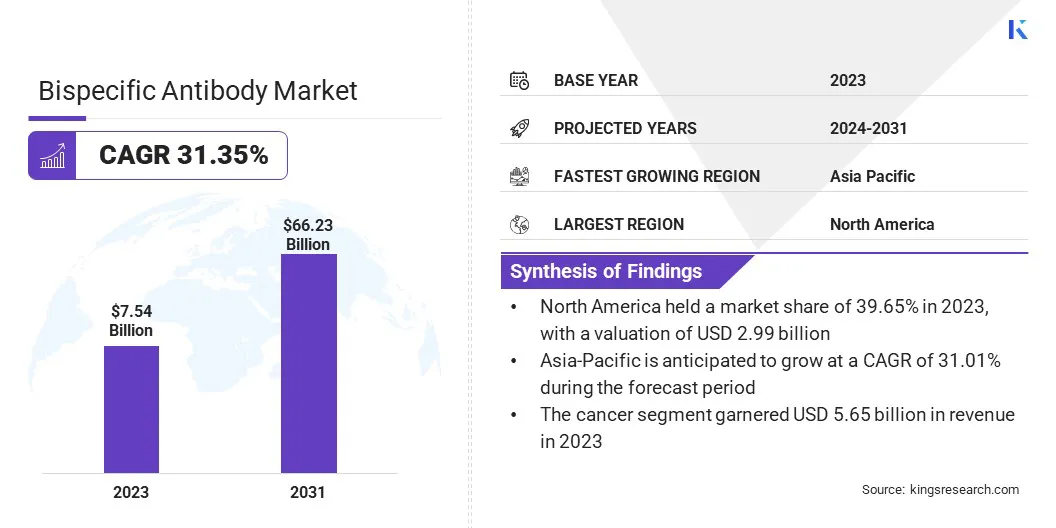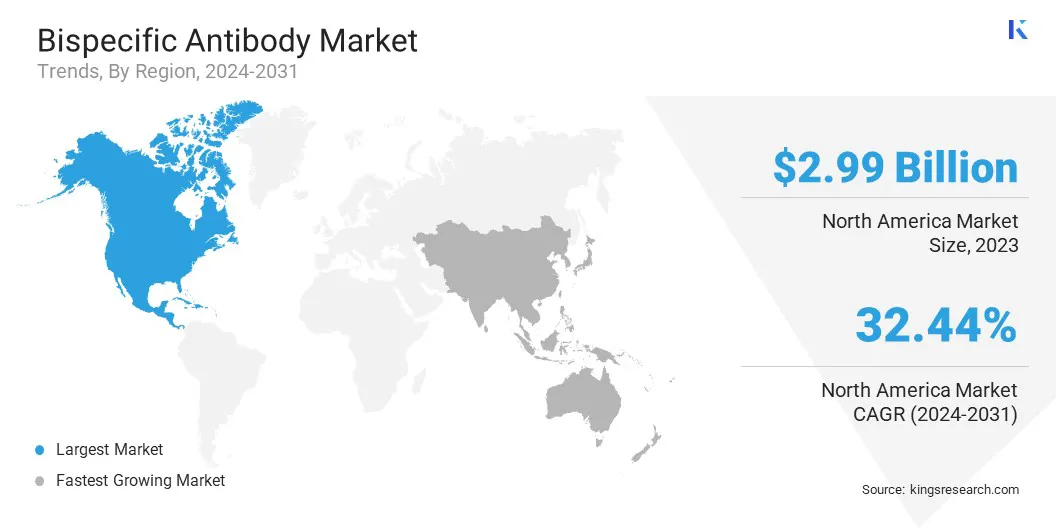Bispecific Antibody Market Size
The global Bispecific Antibody Market size was valued at USD 7.54 billion in 2023 and is projected to grow from USD 9.82 billion in 2024 to USD 66.23 billion by 2031, exhibiting a CAGR of 31.35% during the forecast period. The market is witnessing rapid growth, mainly due to the rising focus on personalized medicine and the development of novel therapeutic strategies.
Emerging research is exploring new mechanisms of action and enhancing the versatility of bispecific antibodies, which are enabling more effective treatments for diverse conditions. Furthermore, the market is benefiting from strategic partnerships and increased funding aimed at fostering innovation and expanding clinical applications.
In the scope of work, the report includes solutions offered by companies such as Genentech, Inc., Amgen Inc., F. Hoffmann-La Roche Ltd, Novartis AG, Regeneron Pharmaceuticals Inc., Sanofi S.A., Johnson & Johnson Services, Inc., Merck & Co., Inc., AbbVie Inc., Eli Lilly and Company, and others.
The bispecific antibody market is experiencing robust growth driven by rising incidences of chronic diseases such as cancer, autoimmune disorders, and infectious diseases. The increasing demand for targeted therapies, coupled with advancements in antibody engineering technologies, is propelling market expansion.
- According to a 2022 report by the National Association of Chronic Disease Directors, over 60% of adult Americans are affected by at least one chronic disease, highlighting a substantial need for effective treatments.
Innovations in dual-targeting and multi-functional antibody formats are enhancing treatment precision and efficacy, addressing unmet medical needs. These advancements are bolstering substantial investments and fostering collaborations within the pharmaceutical industry.
A bispecific antibody is a specialized type of engineered antibody designed to simultaneously bind to two distinct antigens or epitopes. This dual-targeting ability allows bispecific antibodies to engage multiple disease-related targets or cells, thereby offering enhanced precision in treatment compared to traditional monoclonal antibodies.
By simultaneously interacting with two different targets, bispecific antibodies improve therapeutic efficacy, direct immune responses more effectively, and provide novel solutions for complex conditions such as cancer, autoimmune disorders, and infectious diseases. Their advanced targeting capabilities and versatility make them a promising tool in modern therapeutic strategies.

Analyst’s Review
The increasing number of regulatory approvals for bispecific antibodies is significantly boosting the demand and fostering increased investment in research and development.
- For instance, the FDA's approval in October 2022 of Teclistamab-cqyv (Tecvayli, Janssen Biotech, Inc.), the first bispecific B-cell maturation antigen therapy for adults with relapsed or refractory multiple myeloma, highlights this trend.
Moreover, companies are strategically entering into collaborations and partnerships to leverage their combined expertise and technologies, which is accelerating the R&D process and boosting market growth potential. These advancements are fostering investment and innovation within the bispecific antibody market.
Bispecific Antibody Market Growth Factors
The rising incidence of cancer significantly is propelling the growth of the market, as these advanced therapeutics provide a targeted approach to treatment. Bispecific antibodies possess the capability to simultaneously bind to two different antigens or epitopes, enabling more precise targeting of cancer cells while minimizing damage to healthy tissue.
This specificity enhances treatment efficacy by improving the destruction of malignant cells and reducing off-target effects commonly associated with conventional therapies. As the global cancer burden continues to increase, the demand for innovative treatments such as bispecific antibodies, which offer improved outcomes and fewer side effects, is expected to grow.
A significant challenge impeding the development of the bispecific antibody market is the high cost associated with development and production, which limits accessibility and affordability for patients. Furthermore, regulatory hurdles and complex manufacturing processes contribute to delays in the introduction of new therapies to the market, thereby hindering overall growth.
To mitigate these challenges, key players are investing heavily in advanced biomanufacturing technologies and forming strategic partnerships to share resources and expertise. Additionally, companies are actively collaborating with regulatory agencies to streamline approval processes and reduce the time-to-market for new therapies.
Bispecific Antibody Market Trends
Advancements in antibody engineering technologies are continuously accelerating the development and commercialization of bispecific antibodies. Enhanced optimization techniques, such as more precise genetic engineering and improved expression systems, are enabling the creation of antibodies with increased specificity and stability.
Additionally, refined targeting mechanisms, including the development of novel bispecific formats and advanced conjugation methods, are enhancing the ability to target multiple antigens or epitopes simultaneously. These ongoing technological improvements are leading to more effective and versatile bispecific antibodies. These improvements are enabling the treatment of a wider range of diseases and improving therapeutic outcomes, thereby aiding market growth and expanding the product pipeline.
The trend of advancing bispecific antibody formats is propelling the bispecific antibody market growth by expanding the therapeutic potential and addressing complex disease challenges. The continuous development of dual-targeting and multi-functional designs is enabling more precise and effective treatments, which are attracting increased investment and interest from pharmaceutical companies. These innovations are addressing unmet medical needs and improving patient outcomes, thereby increasing demand and stimulating adoption.
Segmentation Analysis
The global market is segmented based on indication, distribution channel, and geography.
By Indication
Based on indication, the bispecific antibody market is categorized into cancer, inflammatory & autoimmune disorder, and others. The cancer segment garnered the highest revenue of USD 5.65 billion in 2023, mainly due to the increasing prevalence of cancer worldwide.
- According to the WHO, approximately 1 in 5 people are expected to develop cancer in their lifetime, and around 1 in 9 men and 1 in 12 women are likely to die from the disease.
This high incidence of this condition boosts the demand for innovative treatments that offer improved efficacy and reduced side effects. Bispecific antibodies are becoming increasingly pivotal in this landscape by targeting multiple cancer antigens simultaneously, enhancing tumor cell destruction, and overcoming resistance mechanisms. Ongoing advancements and FDA approvals for bispecific antibody therapies are further augmenting segmental growth and fostering investment.
By Distribution Channel
Based on distribution channel, the market is categorized into hospital, retail, drugstores, and online. The hospital segment captured the largest bispecific antibody market share of 45.28% in 2023. Hospitals are increasingly integrating bispecific antibodies into their treatment protocols to address complex conditions, particularly cancer and autoimmune disorders.
The pressing need for personalized and targeted therapies further fuels this trend, as bispecific antibodies offer improved precision and efficacy compared to traditional treatments. Additionally, hospitals are majorly benefiting from innovations such as enhanced administration methods and reduced side effects, thereby supporting segmental growth.
Bispecific Antibody Market Regional Analysis
Based on region, the global market is classified into North America, Europe, Asia-Pacific, MEA, and Latin America.

North America bispecific antibody market share stood around 39.65% in 2023 in the global market, with a valuation of USD 2.99 billion. This notable growth is bolstered by the region's advanced healthcare infrastructure, increased investment in research and development, and a robust regulatory framework.
The United States and Canada are at the forefront of adopting and developing bispecific antibody therapies, with numerous biotech firms and pharmaceutical companies actively engaged in innovation and clinical trials. The high incidence of cancer and autoimmune disorders in North America fuels the demand for advanced therapeutics, including bispecific antibodies. Additionally, the dominance of the regional market is reinforced by favorable regulatory pathways and substantial funding for research.
Asia-Pacific is anticipated to witness significant growth at a CAGR of 31.01% over the forecast period. This considerable expansion is supported by increasing healthcare expenditure and rising awareness of advanced therapeutics. Countries such as China, Japan, and South Korea are making substantial investments in biotechnology and pharmaceutical research, thus fostering the development and adoption of bispecific antibodies.
The region's growing population and increasing prevalence of chronic diseases such as cancer are creating a substantial demand for bispecific antibodies. Additionally, supportive government policies and initiatives aimed at promoting healthcare innovation are propelling regional market growth.
Competitive Landscape
The global bispecific antibody market report will provide valuable insight with an emphasis on the fragmented nature of the industry. Prominent players are focusing on several key business strategies such as partnerships, mergers and acquisitions, product innovations, and joint ventures to expand their product portfolio and increase their market shares across different regions.
Companies are implementing impactful strategic initiatives, such as expanding services, investing in research and development (R&D), establishing new service delivery centers, and optimizing their service delivery processes, which are likely to create new opportunities for market growth.
List of Key Companies in Bispecific Antibody Market
Key Industry Development
- June 2023 (Approval): The FDA granted approval for Genentech's Columvi (glofitamab-gxbm). This fixed-duration bispecific antibody is designed for the treatment of adult patients with relapsed or refractory (R/R) diffuse large B-cell lymphoma (DLBCL) not otherwise specified, or large B-cell lymphoma (LBCL) arising from follicular lymphoma, following two or more lines of systemic therapy.
The global Bispecific Antibody Market is segmented as:
By Indication
- Cancer
- Inflammatory & Autoimmune Disorder
- Others
By Distribution Channel
- Hospital
- Retail
- Drugstores
- Online
By Region
- North America
- Europe
- France
- U.K.
- Spain
- Germany
- Italy
- Russia
- Rest of Europe
- Asia-Pacific
- China
- Japan
- India
- South Korea
- Rest of Asia-Pacific
- Middle East & Africa
- GCC
- North Africa
- South Africa
- Rest of Middle East & Africa
- Latin America
- Brazil
- Argentina
- Rest of Latin America


